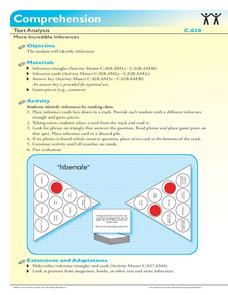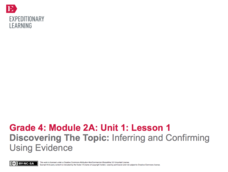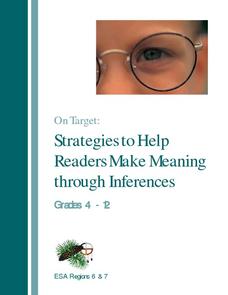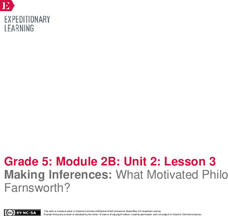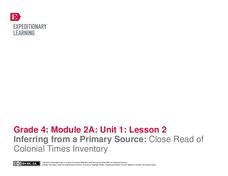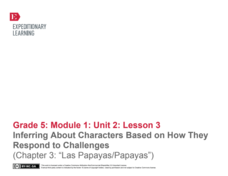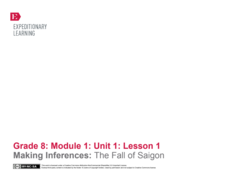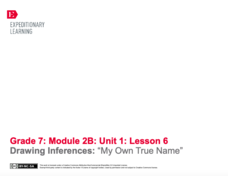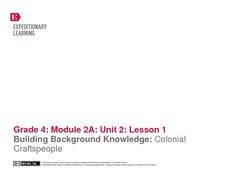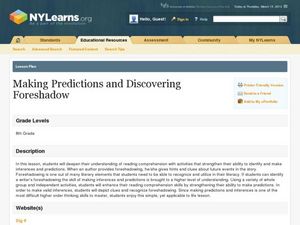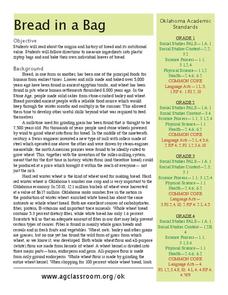Florida Center for Reading Research
Comprehension: Text Analysis, More Incredible Inferences
Reinforce inference skills with a learning game! Scholars read scenarios on cards and match them to a written inference on the triangle. The first pupil to match all their inferences wins!
Curated OER
Mini-Lesson Planning for Inferences
Making inferences and drawing conclusions is a key component to successful active reading. Encourage your class to use context clues and prior knowledge to infer different elements of a story, including the setting, plot, and character...
EngageNY
Discovering the Topic: Inferring and Confirming Using Evidence
Allow your class to figure out what they will be studying through an inquiry-based anticipatory set that involves analysis of mystery documents and practice with making inferences. The lesson plan document includes a detailed description...
EngageNY
Taking Notes Using a Graphic Organizer: Inferring About Work and Play in Colonial America
What was life like in colonial America? Follow this lesson plan and your pupils will find out what people in colonial times did for work and for fun. Ask learners to compare and contrast the two texts and explain what the reading helped...
EngageNY
Taking Notes Using a Graphic Organizer: Inferring About the Importance of Religion in Colonial America
Improve class understanding of colonial times by reading an informational text and filling out the accompanying graphic organizer. Class members work with a partner to read, take notes, make inferences, and synthesize information.The...
Curriculum Corner
Inferencing
Inferencing is a necessary reading skill to uncover non-explicit messages in text. Use the set of resources as a way to guide learners toward becoming expert inferrers through reading prompts and literature with text and without text.
Curated OER
On Target: Strategies to Help Readers Make Meaning through Inferences
Here's a resource that explicitly teaches, models, and provides readers with opportunities to practice the process of drawing inferences from text. Packed with strategies elementary, middle, and high school teachers can use, the resource...
EngageNY
Making Inferences: What Motivated Philo Farnsworth?
Turn on the tube. Learners take a look at pages 10-13 of The Boy Who Invented TV. They work in groups and complete a first read to determine the gist of the section. They then reread the pages to make and revise previous inferences and...
Curated OER
Using Random Sampling to Draw Inferences
Emerging statisticians develop the ability to make inferences from sample data while also working on proportional relationships in general. Here, young learners examine samples for bias, and then use random samples to make inferences...
EngageNY
Inferring from a Primary Source: Close Read of Colonial Times Inventory
Teach your class about colonial America through an examination of primary documents. First though, start vocabulary notebooks for content-specific and academic vocabulary. Pupils can keep this record during the entire module. Once this...
EngageNY
Inferring About Characters Based on How They Respond to Challenges (Chapter 3: "Las Papayas/Papayas")
Start off your day with a quick reading comprehension quiz about chapter three of Esperanza Rising by Pam Muñoz Ryan. After they complete the quiz, pupils participate in a discussion and look closely at the text. A strong Common Core...
EngageNY
Inferring About Characters Based on How They Respond to Challenges (Chapter 4: "Los Higos/Figs")
How do you know what a character's personality is like if an author doesn't tell you? With a focus on character development in Esperanza Rising, pupils complete a jigsaw activity to analyze the actions of Mama, Abuelita, and Miguel. Once...
EngageNY
Making Inferences: What Motivated Philo Farnsworth?
Learners continue their work in The Boy Who Invented TV by examining pages 14-17. They work together to determine the gist of the section during a first read then complete a second read to make inferences, create a summary, and define...
K20 LEARN
Between The Lines: Inferences In The Narrative Life Of Frederick Douglass Excerpt
Good literature can be much like an iceberg requiring readers to presume that the bulk of the meaning may be inferred to be found below the surface. Here's a lesson that asks scholars to conduct a close reading of passages from The...
EngageNY
Making Inferences: The Fall of Saigon
Get hooked! Reel in and hook scholars to the unit with a slide show, text-based activity, and reading exercises. To increase curiosity, learners read only small pieces of Panic Rises in Saigon, but the Exits Are Few. Readers use the...
EngageNY
Drawing Inferences: “My Own True Name”sl.7.1
How much are you worth? Scholars read text dependent questions, and discuss how the text relates to self worth. They then work with partners by having written conversation to make inferences about the text. For homework, pupils correct...
EngageNY
Inferring about Character: Getting to Know Percy (Chapters 1 and 2)
What a character! Scholars look at two chapters in The Lightning Thief to make inferences about the character Percy. They record both the character's challenges and responses. Learners then work in their triads to discuss the gist of...
EngageNY
Building Background Knowledge and Making Inferences: What Is a Natural Disaster?
That's a disaster! Scholars complete a gallery walk to view images and make inferences about natural disasters. They fill out a note catcher about what they observe and infer any questions they may have. They then participate in a World...
EngageNY
Inferring about Character: Close Reading of The Lightning Thief (Chapter 3)
Stick it to them! Scholars work to write the gist of sections of text on sticky notes and place them in chapter three of The Lightning Thief. They then share what they wrote with classmates in their triad. The group reads selections of...
EngageNY
Introducing Promises to Keep and Drawing Inferences: Who Is Jackie Robinson and Why Is He Important? (Promises to Keep, Pages 6–7)
Scholars take a picture walk through the book Promises to Keep: How Jackie Robinson Changed America. They make predictions and complete a Notice/Wonder/Inference note catcher. They then define and analyze words on pages six and seven of...
Curated OER
What Can We Learn From the Past?
What would future archeologists learn from your scholars' personal belongings? Have them bring in a box of "primary sources" from their home. Discuss the difference between observations and inference, using some of your own items to...
EngageNY
Building Background Knowledge: Colonial Craftspeople
In the first lesson plan of this unit on colonial trade, fourth graders gain background knowledge of different jobs performed by early colonists. The class begins with a slide show presentation that includes a variety of great...
Curated OER
Foreshadowing and Making Predictions
"What happens next?" Using real-life scenarios, movies, images, and other prompts, pupils practice making predictions based on inferences from clues. A SMART board activity takes them from making predictions to writing a prediction...
Curated OER
Bread in a Bag
Could the history of bread really be interesting? Yes, it could! An informational text gives scholars wheat production background from 8,000 years ago, discussing different types of bread and the current industry in Oklahoma. Learners...


